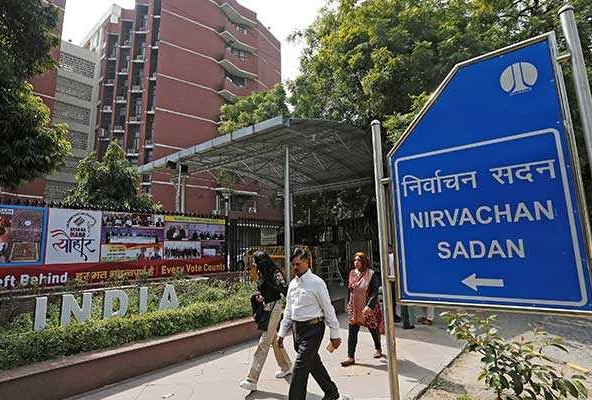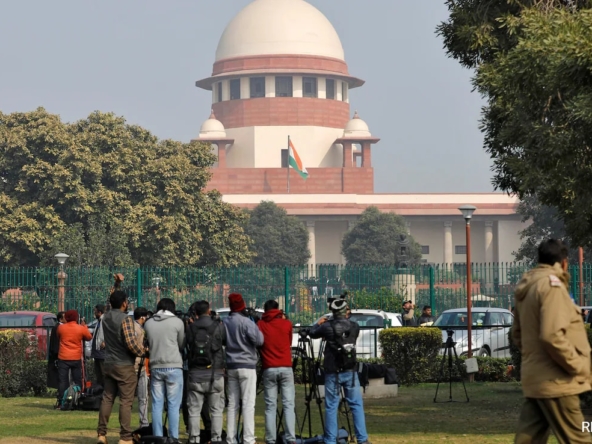
Mr Naidu has denied the corruption allegations
New Delhi:
The Supreme Court on Tuesday delivered a split verdict on former Andhra Pradesh chief minister and TDP chief N Chandrababu Naidu’s plea challenging the high court order refusing to quash the FIR against him in the Skill Development Corporation scam case.
A bench of Justices Aniruddha Bose and Bela M Trivedi differed on the interpretation and applicability of section 17A of the Prevention of Corruption (PC) Act.
Section 17A was introduced by an amendment with effect from July 26, 2018, and the provision stipulates a mandatory requirement for a police officer to seek prior approval from the competent authority for conducting any inquiry or investigation into any offence alleged to have been committed by a public servant under the PC Act.
While Justice Bose said prior approval for conducting a probe for the alleged offences under the PC Act against Mr Naidu was needed, Justice Trivedi said section 17A could not be made applicable retrospectively.
Mr Naidu was arrested on September 9 last year for allegedly misappropriating funds from the Skill Development Corporation when he was the chief minister in 2015, causing a purported loss of Rs 371 crore to the state exchequer. Mr Naidu has denied the allegations.
The Andhra Pradesh High Court had on November 20 last year granted him regular bail in the case.
During the arguments before the top court in the matter, Mr Naidu’s counsel had contended that all allegations in the FIR pertain to decisions, instructions or recommendations made by him when he was the chief minister and section 17A was applicable in the case as the inquiry started in December 2021.
The TDP chief had contended that the FIR against him was registered without obtaining the prior approval of the competent authority in the case, and, therefore, his arrest was illegal.
However, the counsel appearing for the state had argued that Mr Naidu’s petition for quashing the FIR be rejected as the question about the applicability of section 17A of the PC Act does not arise as the provision came into force in July 2018, while the CBI began probing the case in 2017.
While reading out the operative part of the verdict, Justice Bose said in the absence of previous approval, the action initiated under the PC Act shall be held illegal.
He said Mr Naidu cannot be proceeded against for the alleged offences under the PC Act as no previous approval of the appropriate authority was obtained.
“This opinion of this court, however, shall not foreclose the option of the concerned authority in seeking approval in terms of the aforesaid provision. In this case, liberty is reserved for the state to apply for such approval…,” Justice Bose said.
However, he declined to interfere with the September 10, 2023, remand order passed by the trial court.
“Lack of approval in terms of section 17A will not render the entire order of remand non-est,” Justice Bose said.
While reading out the verdict, Justice Trivedi said, “Essentially, I am disagreeing on the interpretation of section 17A”.
She said such a substantial amendment could not be made applicable retrospectively.
Justice Trivedi said section 17A was introduced by an amendment with effect from July 26, 2018.
“Hence, the intention of the legislature was to make the amendment applicable prospectively from a particular date and not retrospectively…,” she said.
Justice Trivedi said the very object of the PC Act is to combat corruption and the object of section 17A is to protect honest and innocent public servants from undergoing harassment for the recommendations made or decisions taken in the discharge of official functions or duties.
She said the absence of approval before conducting the inquiry, enquiry or investigation into the offences alleged to have been committed by a public servant under the PC Act, could never be a ground for quashing the FIR registered against him, more particularly when he is also charged for other offences under the Indian Penal Code in respect of the same set of allegations.
Justice Trivedi said the trial court was completely within the jurisdiction to pass the remand order in the case.
“The impugned judgement of the high court also does not suffer from any illegality or infirmity,” she said.
The bench said since the two judges have taken different opinions on the interpretation of section 17A of the PC Act, the matter be referred to the Chief Justice of India for appropriate directions.
Mr Naidu had moved the top court challenging the high court order dismissing his petition for quashing the FIR against him in connection with the alleged scam.
While dismissing his petition, the high court had said criminal proceedings ought not to be scuttled at the initial stage and quashing an FIR should be an exception rather than the rule.
(Except for the headline, this story has not been edited by NDTV staff and is published from a syndicated feed.)




